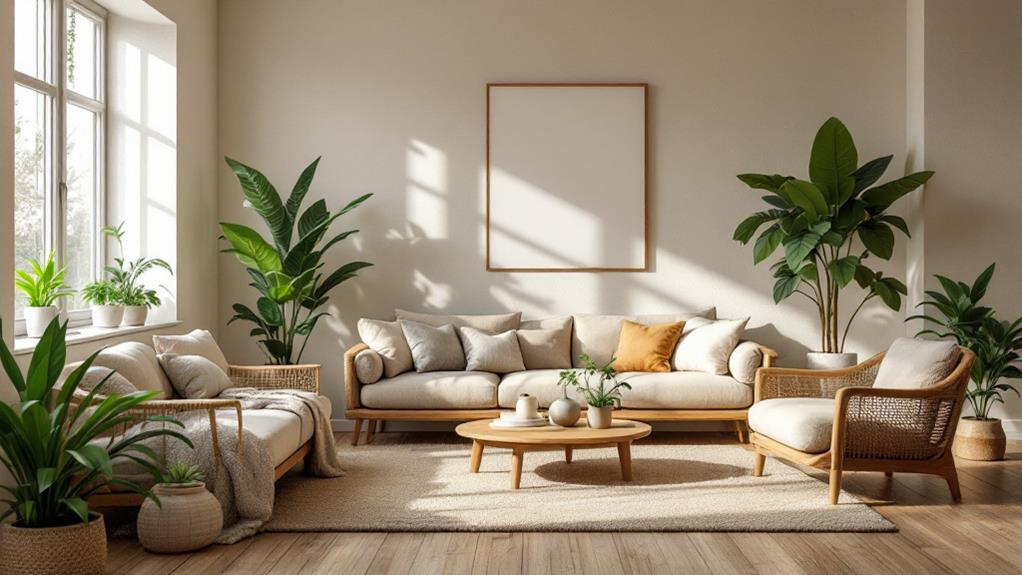
Top 10 Sustainable Furniture Brands for 2025
In 2025, sustainability is at the forefront of the furniture industry, driven by top brands like Avocado, Maiden Home, and Inside Weather. These brands prioritize eco-friendly practices, such as using FSC-certified and reclaimed wood, and have secured certifications like Greenguard and CertiPUR-US®. Ethical sourcing is emphasized by The Citizenry and Sabai, ensuring fair trade and safe labor conditions. Environmental initiatives are advanced by Kaiyo and Joybird, highlighting circular economy efforts and tree planting. With consumer demand on the rise for sustainable living, these brands navigate the intersection of quality, ethics, and customization. A deeper understanding of their commitments awaits.
Key Takeaways
- West Elm leads in sustainable practices with FSC-certified wood and energy-efficient manufacturing.
- Avocado crafts furniture from reclaimed wood, ensuring fair wages and ethical sourcing.
- Sabai offers eco-friendly upholstery with transparency in sourcing and modular design for adaptability.
- Inside Weather integrates tree planting initiatives and customizable modular seating options.
- Kaiyo promotes a circular economy by reselling pre-owned furniture and supporting reforestation efforts.
Avocado
Avocado stands as a beacon of sustainability in the furniture industry, integrating eco-consciousness into every facet of its production process. As a certified B Corporation, Avocado‘s commitment to eco-friendly design and sustainable sourcing is unmatched. Their furniture, crafted from 100% reclaimed wood and responsibly harvested American timber, reflects a dedication to minimizing environmental impact. This approach not only conserves natural resources but also promotes biodiversity by reducing the demand for virgin materials.
The brand’s products are certified non-toxic, boasting Greenguard Gold and MADE SAFE certifications. These credentials guarantee that Avocado’s offerings maintain low levels of harmful chemicals, safeguarding both consumer health and the environment.
Additionally, Avocado operates as a climate-neutral entity, offsetting its carbon emissions through strategic environmental initiatives such as tree planting, which contributes to global carbon sequestration efforts.
Avocado’s commitment to sustainability extends beyond materials to encompass ethical labor practices. The company guarantees fair wages and safe working conditions throughout its supply chain, fostering social responsibility.
As the furniture industry moves towards a more sustainable future, Avocado provides a model for integrating eco-friendly design with sustainable sourcing, setting a new standard for environmental stewardship and social equity.
Maiden Home
Maiden Home stands out in the sustainable furniture landscape through its use of responsibly sourced hardwood and eco-friendly materials, ensuring longevity and reduced environmental impact.
Their commitment to sustainability is further underscored by the use of CertiPUR-US® certified foam, which eliminates harmful chemicals and supports healthier indoor air quality.
As we look towards 2025, Maiden Home’s transparent production methods and eco-friendly certifications position them as a leader in sustainable craftsmanship, offering consumers both peace of mind and high-quality, customizable designs.
Eco-Friendly Certifications Highlight
When considering sustainable furniture options for 2025, one brand that stands out is Maiden Home, primarily due to its impressive array of eco-friendly certifications. The importance of eco labels in sustainable shopping cannot be overstated, as they assure consumers of the environmental integrity of their purchases. Maiden Home’s Greenguard certification is a reflection of its commitment to maintaining rigorous standards for indoor air quality, minimizing chemical emissions from furniture products. This certification supports healthier homes by ensuring the use of materials that are free from harmful chemicals like flame retardants.
Maiden Home’s sustainability credentials are further bolstered by its responsible material sourcing. The brand employs solid hardwood, CertiPUR-US® soy-based foam, and recycled steel springs, underscoring its dedication to eco-friendly practices. This approach not only enhances product longevity but also reduces the environmental impact associated with frequent replacements due to wear and tear.
| Certification | Material Usage | Ethical Practices |
|---|---|---|
| Greenguard | Solid Hardwood | Fair Labor |
| CertiPUR-US® | Soy-Based Foam | Transparent Supply Chain |
| Recycled Steel | Springs | Quality Craftsmanship |
| Chemical-Free | No Flame Retardants | Sustainability Focus |
Natural Materials Usage
Building on their impressive eco-friendly certifications, the emphasis on natural materials is a cornerstone of Maiden Home’s sustainable ethos. The brand’s commitment to sustainable sourcing is evident in their use of solid hardwood from responsibly managed forests. This practice not only guarantees the durability and longevity of their furniture but also minimizes environmental impact, aligning with the principles of sustainability.
The hardwood is complemented by eco-conscious fabrics, including those crafted from recycled materials and organic cotton, which further underscores Maiden Home’s dedication to sustainable practices.
Moreover, Maiden Home’s use of CertiPUR-US® certified foam exemplifies their focus on health and safety, as this foam is manufactured without harmful chemicals, thereby promoting healthier indoor air quality.
A key aspect of their approach to natural materials is the application of natural finishes. By utilizing water-based coatings that are low in volatile organic compounds (VOCs), the brand effectively reduces toxicity and environmental harm.
This commitment to non-toxic finishes not only enhances the aesthetic appeal of their furniture but also aligns with a future-focused vision of sustainability. Through meticulous craftsmanship, Maiden Home guarantees that their products are both sustainable and enduring, reducing waste and fostering a sustainable lifestyle.
Inside Weather
In the domain of sustainable furniture, Inside Weather stands out as a trailblazer with its innovative approach to customizable modular seating options. This brand empowers customers to tailor furniture pieces that seamlessly integrate with their individual spaces and aesthetic preferences. Such customization not only enhances user satisfaction but also aligns with sustainable practices, as it reduces waste by ensuring products are designed to be truly wanted and used.
Inside Weather’s dedication to sustainability is multi-faceted, embracing both environmental and ethical dimensions. By partnering with the National Forest Foundation, the brand commits to planting a tree for every order, considerably contributing to global reforestation efforts. This initiative reflects a broader commitment to ecological stewardship.
In addition, Inside Weather integrates recycled materials, remarkably upcycled plastic bottles, into its manufacturing processes. This approach minimizes environmental impact and exemplifies a forward-thinking strategy in resource utilization.
The brand’s transparency in manufacturing underscores its adherence to ethical sourcing and environmentally friendly practices. By emphasizing durability and the use of sustainable materials, Inside Weather not only offers furniture that is built to last but also fosters a culture of sustainability that is critical for future-focused business models in the furniture industry.
Sabai
Sabai emerges as a distinguished leader in the domain of sustainable furniture, driven by a commitment to blending contemporary design with eco-conscious practices. Specializing in eco friendly upholstery, Sabai utilizes repurposed fabrics that guarantee their products are both stylish and environmentally responsible. This approach not only reduces waste but also aligns with the brand’s ethos of sustainability.
The furniture’s modern aesthetic is underpinned by the use of FSC-certified wood and recycled materials, reinforcing Sabai’s dedication to eco-friendly practices.
A hallmark of Sabai’s offerings is their modular design, which emphasizes durability and longevity. The furniture is designed to be easily assembled and adaptable to various living spaces, allowing consumers to reconfigure pieces as their needs evolve. This flexibility is increasingly important as living spaces become more dynamic, and Sabai’s focus on modularity positions them well for future market demands.
Furthermore, Sabai’s commitment to transparency sets it apart. By providing detailed information about sourcing and manufacturing processes, Sabai fosters trust and accountability.
The brand’s active participation in environmental initiatives, such as a tree planting program for every sofa sold, further exemplifies its dedication to sustainability and reforestation efforts.
West Elm
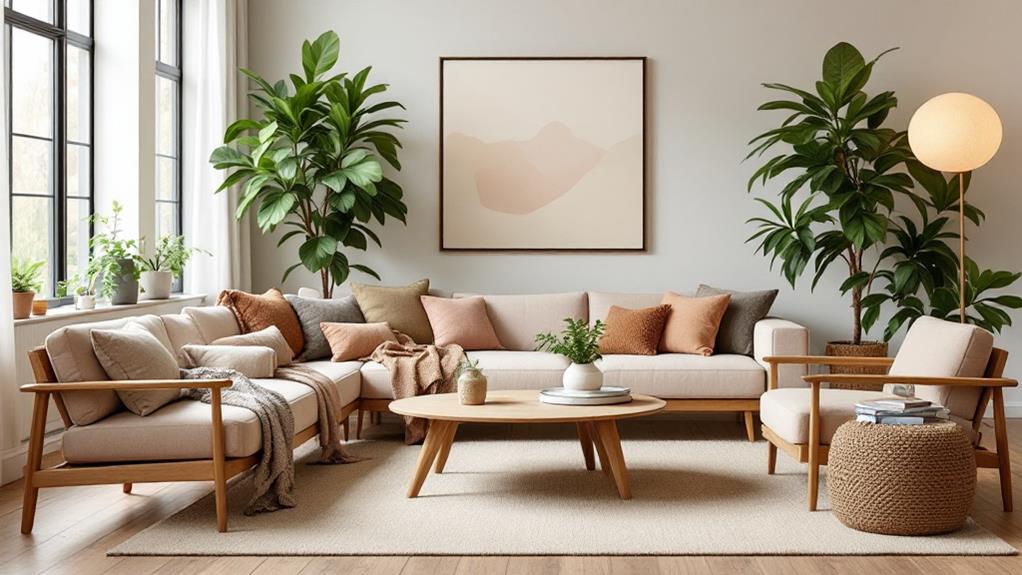
West Elm stands out as a leader in sustainable furniture by prioritizing eco-friendly material sourcing, utilizing FSC certified wood, and ensuring ethical production through partnerships with Fair Trade Certified™ suppliers.
With a forward-thinking approach, they have not only reduced their carbon footprint but also aligned their business practices with extensive environmental and social responsibility goals.
As consumers increasingly demand transparency and sustainability, West Elm’s commitment to these principles positions them as a pivotal player in shaping the future of environmentally conscious furniture design.
Eco-Friendly Material Sourcing
Through its steadfast commitment to sustainable practices, West Elm emerges as a leader in eco-friendly material sourcing within the furniture industry. The brand’s use of Forest Stewardship Council (FSC) certified wood underscores its dedication to responsible forest management, ensuring that its products contribute to the health of global ecosystems.
By prioritizing material transparency, West Elm empowers consumers with the knowledge needed to make environmentally conscious purchasing decisions.
In addition to FSC-certified wood, West Elm showcases innovation by incorporating reclaimed wood and organic materials into its collections. This strategy not only minimizes the reliance on virgin resources but also greatly reduces the environmental footprint associated with furniture production.
Such practices reflect West Elm’s forward-thinking approach to sustainable materials, aligning with global efforts to combat deforestation and resource depletion.
Furthermore, West Elm’s commitment extends beyond material selection; it encompasses a thorough approach to reducing its carbon footprint. By implementing energy-efficient manufacturing processes, the company demonstrates a holistic dedication to sustainability.
This commitment positions West Elm as a pioneering force in the furniture industry, setting a benchmark for others to follow. As consumers increasingly prioritize eco-friendly options, West Elm’s efforts in sustainable material sourcing remain a guiding light for the future.
Fair Trade Commitment
Embracing a responsible approach to global commerce, West Elm’s Fair Trade commitment exemplifies its dedication to ethical practices within the furniture industry. This initiative is manifested through their rigorous dedication to ethical sourcing, ensuring that artisans and workers are afforded fair wages and secure working environments.
By aligning with Fair Trade Certified suppliers, West Elm champions transparency in its supply chain, promoting ethical manufacturing processes and fostering trust with consumers.
The brand’s Fair Trade initiatives extend beyond mere compliance; they actively contribute to artisan empowerment and community development. By partnering with Fair Trade organizations, West Elm facilitates significant social and economic advancements in production regions.
These partnerships enable artisans to reinvest in their families and local economies, creating a ripple effect that promotes sustainable development.
West Elm’s commitment to Fair Trade is not only a reflection of its corporate responsibility but also a strategic component of its product offerings. The brand offers a diverse range of items designed to empower and uplift producers globally, thereby fostering a future where ethical sourcing and artisan empowerment are integral to the furniture industry.
Such forward-thinking practices position West Elm as a leader in sustainable and ethical commerce.
The Citizenry
The Citizenry stands out as a leading sustainable furniture brand by partnering with global artisans to produce exquisite, handcrafted pieces that are both ethically and environmentally responsible. This commitment to artisan craftsmanship and community empowerment is evident in their fair trade practices and the use of high-quality, sustainable materials.
By sourcing directly from artisans’ regions, The Citizenry not only guarantees the authenticity of local craftsmanship but also supports community development through economic growth and fair wages.
Each piece in The Citizenry’s collection tells a story, showcasing the artisans behind the creations and the traditional techniques they employ. This transparency fosters a deeper connection between the consumer and the product, highlighting the importance of sustainability in modern design.
The brand’s curated selection seamlessly blends traditional craftsmanship with contemporary design aesthetics, offering unique, timeless pieces that appeal to environmentally-conscious consumers.
Looking ahead, The Citizenry’s model of transparency and community investment sets a benchmark for future sustainable practices in the furniture industry.
Parachute
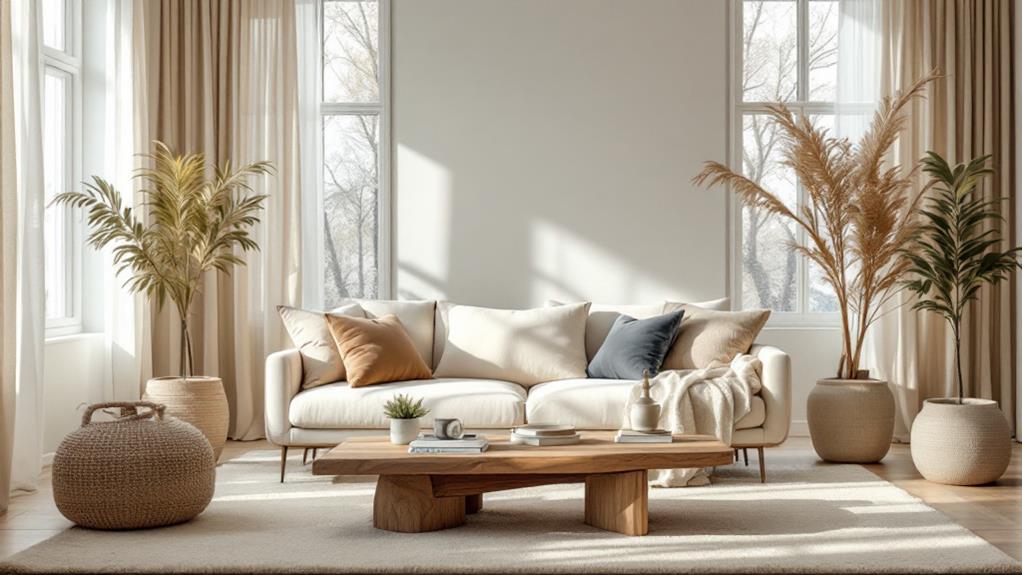
As the furniture industry increasingly prioritizes sustainable practices and ethical sourcing, Parachute emerges as a remarkable contender alongside The Citizenry. Known for its commitment to sustainability, Parachute offers a compelling range of eco friendly textiles, including GOTS certified organic cotton and OEKO-TEX® certified options, ensuring that their products are devoid of harmful substances. The brand’s dedication to sustainable design is evident in its focus on both aesthetics and functionality, crafting modern and elegant pieces suitable for daily use.
Parachute’s ethical sourcing and manufacturing practices play a significant role in its sustainability ethos. By ensuring materials are produced in safe working conditions, the company not only supports the wellbeing of workers but also guarantees high-quality craftsmanship. The brand’s participation in environmental initiatives, such as tree planting for each purchase, underscores its commitment to reforestation and ecological balance.
| Key Features | Description |
|---|---|
| Eco Friendly Textiles | GOTS & OEKO-TEX® certified materials |
| Sustainable Design | Modern, elegant, and functional |
| Environmental Initiatives | Tree planting for each purchase |
With its thorough approach to sustainability and quality, Parachute stands out in the furniture market, appealing to consumers who prioritize eco-conscious living.
Kaiyo
In 2025, Kaiyo exemplifies a forward-thinking approach to sustainability within the furniture industry by championing the circular economy through its innovative resale platform. By concentrating on sustainable practices, Kaiyo guarantees that each furniture piece is meticulously inspected and cleaned before being listed for resale.
This commitment not only assures quality for buyers but also considerably contributes to environmental conservation. By diverting over six million pounds of furniture from landfills, Kaiyo actively reduces waste, aligning with global efforts to combat environmental degradation.
Kaiyo’s business model is a proof of the viability of a circular economy. It facilitates the buying and selling of pre-owned furniture, thereby making sustainable living accessible to eco-conscious consumers. This approach supports the reduction of new production demands, further minimizing ecological footprints.
Key Features of Kaiyo:
- Environmental Responsibility: For every order placed, Kaiyo plants a tree, aiding in global reforestation efforts and promoting long-term ecological health.
- Diverse Selection: The platform offers a wide range of styles, allowing consumers to discover unique, secondhand pieces that suit their aesthetic and sustainable practices.
- Quality Assurance: Each item undergoes thorough inspection and cleaning, guaranteeing high standards and customer satisfaction in furniture resale.
Joybird
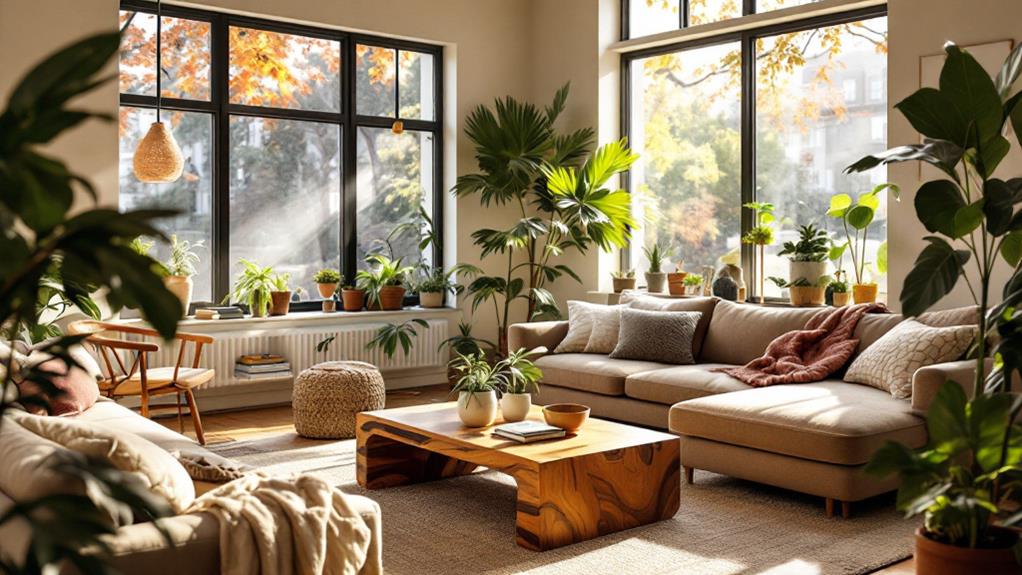
While Joybird is renowned for its customizable mid-century modern furniture, the brand is making significant strides in sustainability by integrating eco-friendly materials and ethical practices into its operations. Through its extensive customization options, Joybird allows consumers to tailor furniture pieces to their specific tastes, offering a broad spectrum of fabrics and styles. This flexibility does not come at the expense of environmental responsibility; the company utilizes FSC-certified wood, ensuring that their products contribute to the preservation of forests and biodiversity.
Central to Joybird’s furniture sustainability ethos is their collaboration with One Tree Planted. This initiative plants a tree for every item sold, reflecting a tangible commitment to combating deforestation. Additionally, the brand employs non-toxic finishes, aligning with consumer demand for healthier home environments.
The ethical labor practices Joybird adheres to are equally commendable, ensuring competitive wages and safe working conditions for their manufacturing workforce, which enhances the company’s integrity and social responsibility.
Joybird’s commitment to quality craftsmanship is evidenced by its durable products, backed by a one-year warranty against defects. As consumers increasingly prioritize sustainable living, Joybird’s approach positions it as a forward-thinking leader in the eco-conscious furniture industry.
Frequently Asked Questions
What Type of Furniture Is Most Sustainable?
The most sustainable furniture integrates eco-friendly materials like FSC-certified wood and natural fibers, alongside circular design principles. This approach promotes longevity, adaptability, and reduced environmental impact, aligning with future-focused sustainability goals through innovative, evidence-based practices.
Which Major Furniture Company Is Making Efforts to Be More Sustainable?
West Elm is making significant strides in sustainability by utilizing eco-friendly materials and sustainable manufacturing practices. Their commitment includes reclaimed wood usage and partnerships with Fair Trade Certified™ suppliers, reflecting a future-focused approach to ethical production.
What Is the Best Furniture Brand in the World?
Determining the best furniture brand globally involves evaluating luxury furniture makers renowned for integrating innovative design with eco-friendly materials. Future-focused brands like Herman Miller and West Elm lead by combining sustainability with high-quality craftsmanship, appealing to discerning consumers.
Which Company Is Best for Furniture?
Determining the best furniture company hinges on their use of eco-friendly materials and ethical sourcing. Brands like Avocado and Thuma exemplify future-focused sustainability through climate-neutral operations and responsibly sourced wood, setting benchmarks for the industry.
Conclusion
The exploration of sustainable furniture brands highlights the industry’s shift towards environmentally responsible practices, with companies like Avocado and Maiden Home leading in eco-friendly materials and ethical production. Brands such as Inside Weather and Sabai exemplify innovation in customizable and sustainable design. The inclusion of West Elm and The Citizenry underscores the mainstream adoption of sustainability. As the demand for sustainable furniture grows, these brands set a precedent for future industry standards, promoting both environmental stewardship and consumer awareness.
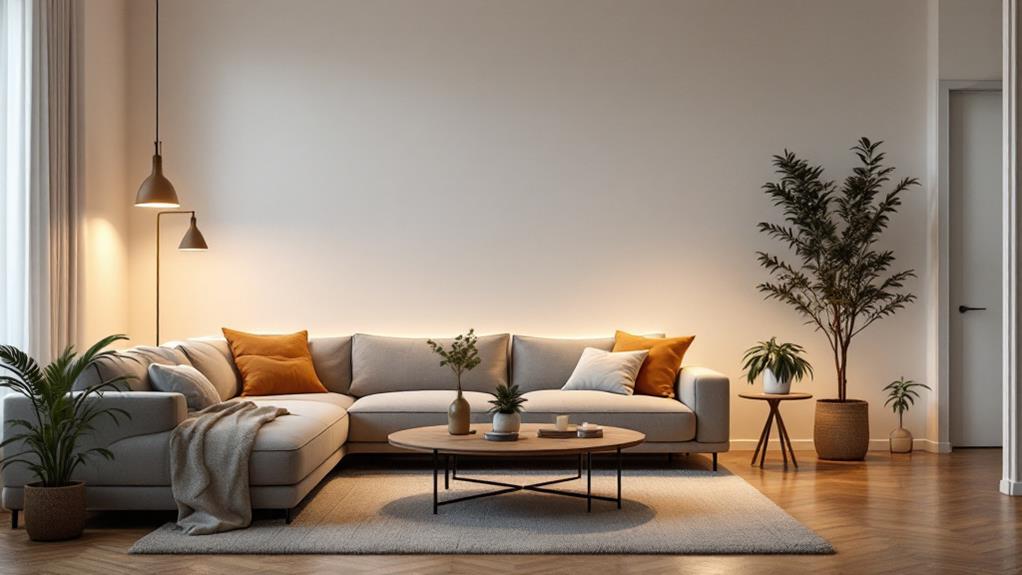


Leave a Reply